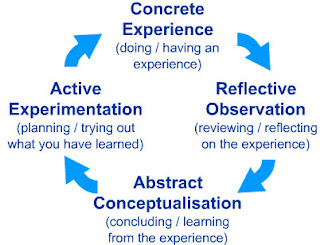“Frogs in a bucket – Two frogs fell in a bucket of milk. One couldn't see a solution for how to get out and slowly sank to the bottom. The other one swam round and round contemplating how to solve the problem of hopping out of the milk. By the morning that frog's swimming round and round had churned the milk into butter and he was able to hop out of the bucket.”
WHAT AM I DOING HERE –
I find as I write this blog, as I collect data, and reflect over the entire process that has been involved with my knowledge in pursuing a master’s degree that it is not necessary for me to know exactly what I am doing or precisely where I am going. Being aware of the final outcome or a general direction I sometimes all that is needed; especially in regard to this study. This is becoming more and more evident.
Qualitative research is oriented towards investigation of meaning; data is often in the form of words and can be derived from in-depth observation. When the paradigm of research shifted to qualitative as viable and credible research, a myriad of methods developed. Also, considering race, class, gender the writing became reflexive… My process of deciding what type of method my research is followed this path….and this confusion, so to speak, may be helpful in comforting some of you who are in Module Two and having feelings of being a fish out of water.
I was not aware of trying to come up with some unknown theory, although research about Grounded Theory seemed relevant and interesting to me. The stage of analysis for grounded theory seems to be appropriate for my research – investigating and examining goal-setting; affirmations; mindfulness; and visualization in the training of dancers.
I had really not come to an appropriate understanding of the methodology I would be using in my research by the time I completed Module Two. I spent too much time concerned about other things in the research process. Mainly in formulating an inquiry and trying to have a perfect question.
Now as I collect data now through recordings, media, lecture, interviews and literature review about mindset and these positive psychology tools(goal-setting; affirmations; mindfulness; and visualization) which is the context of my inquiry – certain concepts, related elements and themes are becoming apparent.
Ah – INDEED! “Data does have a life of its own!”
Question: Is my task to gain knowledge about critically-shared meaning that form the behaviours and reality of participants being studied?
Me: “Hmmmmm, this is getting frustrating, because what I think I wanted is different from what I am getting! I am becoming increasingly curious as to what it is that I am getting, though, so let’s just keep going!”
I find comfort in another quote from the Module Three Handbook:
“What kind of data is it that you gathered? – you may have intended to get one thing and in fact when you did your data collection you got something else. So although you said what you wanted to do in your project plan (and you will also explain this starting point in your introduction in the Critical Review) it is important to show you know what it is you got.”
Codes, categories, concepts, and theories – SO MANY – However there are certain themes that are emerging!
I am finding that this blogging, note-taking, are leading me to other methodologies – if I am understanding methods correctly.
Narratology – The study of narrative and narrative structure and how these affect our perception!
Me: “WHAT! Storytelling is a qualitative research method?” (Hand to head) Of course, it is. This is interesting because my research has to do with the effects of visualization, mindfulness, goal-setting, and affirmations (or self-talk)….doesn’t that follow a narrative paradigm?
Question: Does my interpretive perspective consider an organization as a subjective universe grasped through the representations that the ‘actors’ summon in their narrations?
Notes: Narrative, central values, culture or organization, differences, contradictions
Notes: Perhaps this is structure only?
Transcript Poetry is found between field notes/texts and the final research report - code for themes, collaborate with participant to make sure the message of the original message is in text.
Are these Forms of Evaluation?
Other Notes:
I AM I THINK:
- engaging in extensive field work where data collection is mainly by interviews, symbols, artifacts, observations, and many other sources of data.
- researcher in ethnography type of research looks for patterns of the group's mental activities, that is their ideas and beliefs expressed through language or other activities, and how they behave in their groups as expressed through their actions that the researcher observed.
- the researcher gathers what is available, what is normal, what it is that people do, what they say, and how they work.
Perhaps what I am doing here is an ethnography –
In any case, I MUST GET ON WITH IT; and if I could or would describe a consistent theme in my study it is…..GET ON WITH IT….
That being said I am aware that the data analysis equals/and/or involves interpretations of the functions and meanings of my findings – the words, images, context, and actions of every aspect or my inquiry.
I’M GOING TO GET ON WITH IT!
The following are helpful resources in informing this blog.
1. Pernecky, T. (2016). Epistemology and Metaphysics for Qualitative Research. London, UK: Sage Publications.
2. Aldiabat, Khaldoun; Navenec, Carole-Lynne (4 July 2011). "Philosophical Roots of Classical Grounded Theory: Its Foundations in Symbolic Interactionism" (PDF). The Qualitative Report. 16: 1063–80. Retrieved 5 December 2014.
3. Richardson,L. (2000). "Evaluating ethnography," in Qualitative Inquiry, 6(2), 253-255
4. Module Three Handbook

